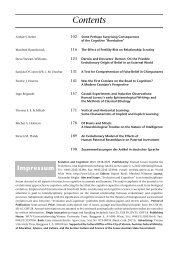The Seven Sins of Evolutionary Psychology - Konrad Lorenz Institute
The Seven Sins of Evolutionary Psychology - Konrad Lorenz Institute
The Seven Sins of Evolutionary Psychology - Konrad Lorenz Institute
Create successful ePaper yourself
Turn your PDF publications into a flip-book with our unique Google optimized e-Paper software.
<strong>Evolutionary</strong> Ethicswere validated, I take it that this would be a harsh—though perhaps not fatal—criticism <strong>of</strong> that aspect <strong>of</strong>KANTIAN ethics (at least from the point <strong>of</strong> view <strong>of</strong>anyone who wants to propose useful moral rules).3.2 Emotional predispositionsNext, let us look at the emotional dispositions withwhich our evolutionary past has left us. Since‘ought’ implies ‘can’, it would seem foolish to havea moral rule which demanded behaviours <strong>of</strong> whichwe were emotionally (or otherwise) incapable, ornearly so. A case in point: all available evidencepoints to a general human predisposition to givepreferential treatment to friends and family. 9 Notonly is this tendency apparently universal amonghuman cultures, it also shows up (under the title‘kin altruism’) in a large number <strong>of</strong> animal species.Flying in the face <strong>of</strong> this apparently universalhuman tendency is the Benthamite claim that“each is to count for one and none for more thanone”. This Utilitarian standard requires preciselythat my brother not count for more than a strangerin my moral deliberations. I submit that if we wantour moral rules to be respected and adhered to, theyat least ought not to demand that we forgo stronglyingrained behaviours unnecessarily.It may be objected that humans display all sorts<strong>of</strong> nasty predispositions that ought not to be excusedsimply because they are ‘natural’. I agree, and notsimply because I want to avoid committing the naturalisticfallacy. For example, regardless <strong>of</strong> how ingrainedour tendencies toward aggression are, weneed to place moral restrictions on aggressive behaviour.Yet in the case both <strong>of</strong> aggression and <strong>of</strong> favouritism,the crucial point is to limit socially destructivebehaviour. Thus, while our sense <strong>of</strong> justicedemands that we limit favouritism in cases such asthe awarding <strong>of</strong> government contracts, there will bemany situations in which preferential treatment <strong>of</strong>family and friends seems not just forgivable, but appropriate.Likewise, while it is socially imperative toprohibit the killing <strong>of</strong> innocents, it seems unnecessaryto forbid certain other displays <strong>of</strong> aggression, forexample organized sports.Further, consider the fact that there may be anumber <strong>of</strong> moral rules that could mediate any givensocial situation. For example, we might determinesuitable patterns <strong>of</strong> economic distribution in one <strong>of</strong>three ways:1) by assigning to each individual the right tosome level <strong>of</strong> quality <strong>of</strong> life (i.e., a form <strong>of</strong> Deontology);2) by claiming that a certain pattern <strong>of</strong> distributionmaximized the net benefits to society as a whole(i.e., Utilitarianism); or3) by claiming that a certain pattern <strong>of</strong> distributionwould be agreed to in a (hypothetical) fair bargainingsituation (i.e., Contractarianism).Each <strong>of</strong> these rules is in some sense plausible, andeach might even point to a similar outcome. So instrumentally,it might not much matter which onewe choose. I suggest that if one <strong>of</strong> them turns out tobe psychologically implausible, this can help uschoose among these competing moral standards.4. Game <strong>The</strong>ory and Social ConventionsWhat can we say, from an evolutionary perspective,about the particular rules that will work well asmoral rules? <strong>The</strong> evolutionary perspective leads usto be interested in the function <strong>of</strong> moral rules; ourfocus should be on determining how different ruleswill function within a social milieu. Game theorycomprises a set <strong>of</strong> tools that can be used to study,from a theoretical point <strong>of</strong> view, the social mechanisms<strong>of</strong> morality. We can usefully think <strong>of</strong> a moralrule as a strategy for solving a particular social-coordinationproblem. Game theory, as the study <strong>of</strong> strategicdecision–making, 10 can illuminate moralsituations by reducing them to their basic strategicform. From this perspective, game theory can actuallyserve two important functions with regard tomoral theory.4.1 <strong>The</strong> function <strong>of</strong> moralityFirst, we can use game theory to illuminate thefunction(s) <strong>of</strong> morality. For example, GAUTHIER(1986) uses game theory to argue that morality is asolution to problems <strong>of</strong> strategic interaction such asthe Prisoner’s Dilemma. Economist Ken BINMORE(1994) argues that morality is a device for choosingamong various stable equilibria in multi-persongames. (A game is said to be in equilibrium wheneach player’s choice <strong>of</strong> strategies is the best responseto her opponent’s choice <strong>of</strong> strategies.)An example may help to illustrate this point.Imagine a game in which our goal is to agree upon asocial contract (in the non-technical sense), whichinvolves negotiating a set <strong>of</strong> rules for us to live by.We can reduce this problem to its strategic essenceby representing it in simplified form as a game. Letus look at the following 2–person game, where x, y,and z are possible actions that each <strong>of</strong> us could take.If we think <strong>of</strong> this game as representing negotiationEvolution and Cognition ❘ 101 ❘ 2001, Vol. 7, No. 1








